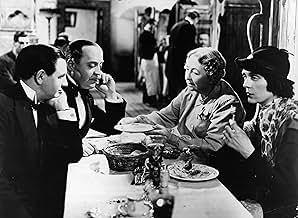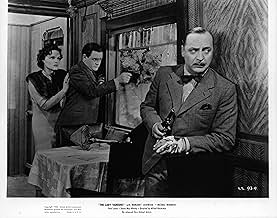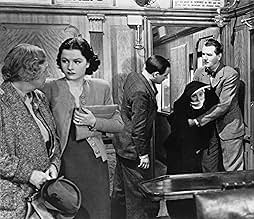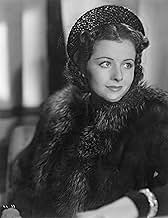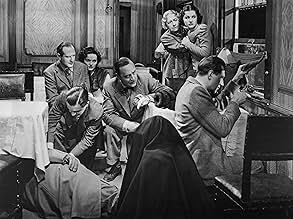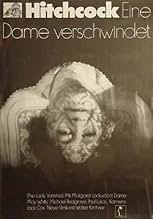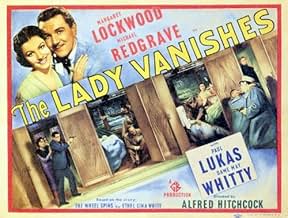VALUTAZIONE IMDb
7,7/10
59.445
LA TUA VALUTAZIONE
Mentre viaggia attraverso l'Europa continentale, una ragazza ricca di alto borgo si accorge che una signora anziana sembra essere scomparsa dal treno.Mentre viaggia attraverso l'Europa continentale, una ragazza ricca di alto borgo si accorge che una signora anziana sembra essere scomparsa dal treno.Mentre viaggia attraverso l'Europa continentale, una ragazza ricca di alto borgo si accorge che una signora anziana sembra essere scomparsa dal treno.
- Regia
- Sceneggiatura
- Star
- Premi
- 1 vittoria e 1 candidatura in totale
May Whitty
- Miss Froy
- (as Dame May Whitty)
Selma Vaz Dias
- Signora Doppo
- (as Zelma Vas Dias)
Catherine Lacey
- The Nun
- (as Catherine Lacy)
Recensioni in evidenza
Although Hitchcock was noted for his wit and often sprinkled his films with wickedly funny moments, he seldom gave comic elements such a free reign as he did in THE LADY VANISHES, which is among the most memorable of his early British films. Charmingly cast with Margaret Lockwood, Michael Redgrave, and Dame May Witty in the leads, the extremely witty script mixes 1930s romantic froth with increasingly tense suspense in the story of sharp witted young woman (Lockwood) who befriends an elderly lady (Witty) during a train journey--and is extremely disturbed when, as the title states, the lady vanishes.
Many regard this as the best of Hitchcock's early work, and it is easy to see why: the film demonstrates his growing talent for building suspense from an unlikely mix of the commonplace and the incredible. He is also remarkably blessed in his cast, with Lockwood and Redgrave possessing considerable chemistry and Dame May Witty particularly endearing in one of the character roles at which she so excelled; the supporting cast is also particularly memorable.
Hitchcock guides them all with never a misstep through a complex script that progresses from very lighthearted to extremely sinister and then back again, and the result leaves audiences with both the satisfaction of a well-made thriller and the glow of a romantic comedy. Although it lacks the subtle tones of his later work, THE LADY VANISHES is among my own favorites by Hitchcock, and fans who have never seen it are in for a real treat. Highly recommended.
Gary F. Taylor, aka GFT, Amazon Reviewer
Many regard this as the best of Hitchcock's early work, and it is easy to see why: the film demonstrates his growing talent for building suspense from an unlikely mix of the commonplace and the incredible. He is also remarkably blessed in his cast, with Lockwood and Redgrave possessing considerable chemistry and Dame May Witty particularly endearing in one of the character roles at which she so excelled; the supporting cast is also particularly memorable.
Hitchcock guides them all with never a misstep through a complex script that progresses from very lighthearted to extremely sinister and then back again, and the result leaves audiences with both the satisfaction of a well-made thriller and the glow of a romantic comedy. Although it lacks the subtle tones of his later work, THE LADY VANISHES is among my own favorites by Hitchcock, and fans who have never seen it are in for a real treat. Highly recommended.
Gary F. Taylor, aka GFT, Amazon Reviewer
The Lady Vanishes is a wonderful piece of fluff, the culmination of Hitchcock's British period, after which he started to explore more serious themes in his American films. Of course the basic plot is absurd, centering around the most ridiculous way to get a secret message through one can think of, and why did.....o well, never mind, it's the handling that matters, and Hitchcock achieves a near perfect balance here of humour and suspense that he only really matched on one other film, North By Northwest.
The film spends 20 or so minutes just introducing it's characters, but they are all so great, especially the two men so obsessed with returning to a cricket match that a case of disappearance and possibly murder is relatively unimportant, that it hardly matters, while Michael Redgrave and Margaret Lockwood simply sparkle as the main couple who of course initially can't stand each other. Once on the train, the ensuring mystery and sleuthing are riveting,and full of fantastic little details- the name on the window, the nun with high heeled shoes, the fight amidst a magician's paraphenalia The final shootout is excellently staged and still quite exciting. The laughs are constant, with some helarious lines, but they never detract from the suspense. Of course there's those shoddy model shots, but hell, this is a film from 1939!
Hitchcock had countless classics to come, including such complex masterpieces as Vertigo and Rear Window, but the delightful, hugely enjoyable The Lady Vanishes is a little masterpiece of it's own.
The film spends 20 or so minutes just introducing it's characters, but they are all so great, especially the two men so obsessed with returning to a cricket match that a case of disappearance and possibly murder is relatively unimportant, that it hardly matters, while Michael Redgrave and Margaret Lockwood simply sparkle as the main couple who of course initially can't stand each other. Once on the train, the ensuring mystery and sleuthing are riveting,and full of fantastic little details- the name on the window, the nun with high heeled shoes, the fight amidst a magician's paraphenalia The final shootout is excellently staged and still quite exciting. The laughs are constant, with some helarious lines, but they never detract from the suspense. Of course there's those shoddy model shots, but hell, this is a film from 1939!
Hitchcock had countless classics to come, including such complex masterpieces as Vertigo and Rear Window, but the delightful, hugely enjoyable The Lady Vanishes is a little masterpiece of it's own.
From 1938, The Lady Vanishes is clearly where Hitch was getting comfortable in his trade. Starting slowly, it soon revs up with mystery and intrigue. But I think that was the whole point. A seemingly innocuous day can lead itself into adventure.
Starting in some remote European village, a woman meets a little old lady. Getting on the train the next day, the old lady vanishes without a trace while she is asleep. When she asks about the lady, people say that there was no old lady. The mystery then ensues as our leading lady tries to uncover the plot behind a woman she knows was there.
The main aspect of this movie is the everyday humor that is applied. The two English fellows who are only looking for the latest cricket scores, score themselves some remarkable laughs. Our hero that comes to the leading woman's assistance is funny and charming himself. The time spent at the beginning in the hotel may seem to be off topic, making a viewer wonder where the mystery is, but the point is that the viewer becomes acquainted with the characters and are much more believable to the viewer. Again, I think Hitch was showing us our next door neighbors and how they can rise up against unusually dangerous circumstances. I think my analysis of Hitch would be his championing the moral fiber of everyman. I think that is why Hitchcock films still stand today as some of the best ever made.
This movie receives my major recommendation. Not done yet. I got more to view and review. What fun!
Starting in some remote European village, a woman meets a little old lady. Getting on the train the next day, the old lady vanishes without a trace while she is asleep. When she asks about the lady, people say that there was no old lady. The mystery then ensues as our leading lady tries to uncover the plot behind a woman she knows was there.
The main aspect of this movie is the everyday humor that is applied. The two English fellows who are only looking for the latest cricket scores, score themselves some remarkable laughs. Our hero that comes to the leading woman's assistance is funny and charming himself. The time spent at the beginning in the hotel may seem to be off topic, making a viewer wonder where the mystery is, but the point is that the viewer becomes acquainted with the characters and are much more believable to the viewer. Again, I think Hitch was showing us our next door neighbors and how they can rise up against unusually dangerous circumstances. I think my analysis of Hitch would be his championing the moral fiber of everyman. I think that is why Hitchcock films still stand today as some of the best ever made.
This movie receives my major recommendation. Not done yet. I got more to view and review. What fun!
"Well, anyway, I refuse to be discouraged. Faint heart never found old lady."
Ah, this was a great movie! One of Hitch's best, and certainly one of his most entertaining. It was funny, thrilling, and just plain old fun to watch.
The story is quite simple. A sweet old lady disappears on a train, and the only person who admits ever seeing her, is a young woman who met her the night before. As she searches for the old lady, she's helped by a roguish young man, and they soon begin to wonder just who this lady is, where she went, and why on earth would so many people go through so much trouble to make it seem like she never existed. It all makes for a very compelling mystery.
The Lady Vanishes features some of the best characters I've ever seen in a Hitchcock film. Margaret Lockwood and Michael Redgrave were great as the two main protagonists, and the witty banter between the two was equaled only by the two dry, cricket-obsessed Englishmen who provided so much of the humor of the film. I found this movie to be similar to Rear Window (no wonder I enjoyed it so much), as there are many subplots among the minor characters that are almost as interesting as the main story.
I firmly believe that this is the best I've seen of Hitchcock's early movies. It has everything from shootouts to nuns in high heels. The Lady Vanishes will convert you to being a fan of Alfred, if you're somehow (drugs?) not already.
Ah, this was a great movie! One of Hitch's best, and certainly one of his most entertaining. It was funny, thrilling, and just plain old fun to watch.
The story is quite simple. A sweet old lady disappears on a train, and the only person who admits ever seeing her, is a young woman who met her the night before. As she searches for the old lady, she's helped by a roguish young man, and they soon begin to wonder just who this lady is, where she went, and why on earth would so many people go through so much trouble to make it seem like she never existed. It all makes for a very compelling mystery.
The Lady Vanishes features some of the best characters I've ever seen in a Hitchcock film. Margaret Lockwood and Michael Redgrave were great as the two main protagonists, and the witty banter between the two was equaled only by the two dry, cricket-obsessed Englishmen who provided so much of the humor of the film. I found this movie to be similar to Rear Window (no wonder I enjoyed it so much), as there are many subplots among the minor characters that are almost as interesting as the main story.
I firmly believe that this is the best I've seen of Hitchcock's early movies. It has everything from shootouts to nuns in high heels. The Lady Vanishes will convert you to being a fan of Alfred, if you're somehow (drugs?) not already.
This is the best of the early Hitchcock films. The plot is absorbing, the dialogue clever and the cast great. Whether or not this was the first of the director's films to place its principal action on a moving train I cannot say, but it's a theme that would come back again in his later work, most notably in "Strangers on a Train."
The film gets off to a somewhat rocky start with the camera panning over an Alpine inn and a train halted mid-journey by an avalanche. I agree with the review who observes that we've become spoilt by more sophisticated special effects. A Lionel half buried in a heap of bleached wheat flower just doesn't cut it nowadays. Think also of the stick figure engulfed in the munitions factory explosion in "Saboteur." I suppose directors of that era had to do with whatever was available.
But after this point the film really takes off, and one scarcely recalls the unpromising opening. Viewers always look for the chemistry or lack thereof between actors. Well, Lockwood and Redgrave definitely have it. One cannot help but enjoy seeing how the initial sparks flying between their clashing characters develop into true love by movie's end. As the two are making their way through the train trying to locate Whitty, they move from one barely plausible predicament to another. But we love it, as one witty exchange turns quickly into another. (For example, Lockwood is asked to describe the missing Whitty and launches into an extremely detailed portrait that leaves not a single button unaccounted for. Then she ends by saying, "That's all I can remember." Counters Redgrave dryly: "Well, you can't have been paying attention.")
Much of the film's action occurs in the fictional country of Bandrika, which seems to be a thinly disguised stand-in for nazi-controlled Austria, so recently annexed by Hitler's Germany. As an amateur linguist, I found myself trying to make sense of the made-up "Bandrikan" spoken by the natives, but of course was unable to do so. (What could it be? A Finno-Ugric language? :) Most of the time the identity of Hitchcock's villains remains deliberately vague, except in "Notorious" and "Torn Curtain," where they are nazis and communists respectively. It works better when he leaves us guessing.
As an amateur musician I loved Hitch's "macguffin," namely, the secret formula encoded in a song which the protagonists had to memorize and carry to the Foreign Office in London. (I should think, however, that a genuine secret message might translate into something more like Schoenberg's twelve-tone music than a central European folk song, but of course that would hardly work in a film. :)
The early Hitchcock seemed to like shootouts, as seen also in the first version of "The Man Who Knew Too Much." But shootouts are an ineffective way to convey suspense, and this is perhaps the one thing that dims what is otherwise a masterpiece.
It's too bad the director lived long enough to see this film remade in 1979. Cybil Shepherd is no Margaret Lockwood, and it's pretty unpleasant-almost embarrassing-to see her shrieking her way through each scene. Couldn't they have waited a few years until he had passed on? They ought to have let him die in peace.
The film gets off to a somewhat rocky start with the camera panning over an Alpine inn and a train halted mid-journey by an avalanche. I agree with the review who observes that we've become spoilt by more sophisticated special effects. A Lionel half buried in a heap of bleached wheat flower just doesn't cut it nowadays. Think also of the stick figure engulfed in the munitions factory explosion in "Saboteur." I suppose directors of that era had to do with whatever was available.
But after this point the film really takes off, and one scarcely recalls the unpromising opening. Viewers always look for the chemistry or lack thereof between actors. Well, Lockwood and Redgrave definitely have it. One cannot help but enjoy seeing how the initial sparks flying between their clashing characters develop into true love by movie's end. As the two are making their way through the train trying to locate Whitty, they move from one barely plausible predicament to another. But we love it, as one witty exchange turns quickly into another. (For example, Lockwood is asked to describe the missing Whitty and launches into an extremely detailed portrait that leaves not a single button unaccounted for. Then she ends by saying, "That's all I can remember." Counters Redgrave dryly: "Well, you can't have been paying attention.")
Much of the film's action occurs in the fictional country of Bandrika, which seems to be a thinly disguised stand-in for nazi-controlled Austria, so recently annexed by Hitler's Germany. As an amateur linguist, I found myself trying to make sense of the made-up "Bandrikan" spoken by the natives, but of course was unable to do so. (What could it be? A Finno-Ugric language? :) Most of the time the identity of Hitchcock's villains remains deliberately vague, except in "Notorious" and "Torn Curtain," where they are nazis and communists respectively. It works better when he leaves us guessing.
As an amateur musician I loved Hitch's "macguffin," namely, the secret formula encoded in a song which the protagonists had to memorize and carry to the Foreign Office in London. (I should think, however, that a genuine secret message might translate into something more like Schoenberg's twelve-tone music than a central European folk song, but of course that would hardly work in a film. :)
The early Hitchcock seemed to like shootouts, as seen also in the first version of "The Man Who Knew Too Much." But shootouts are an ineffective way to convey suspense, and this is perhaps the one thing that dims what is otherwise a masterpiece.
It's too bad the director lived long enough to see this film remade in 1979. Cybil Shepherd is no Margaret Lockwood, and it's pretty unpleasant-almost embarrassing-to see her shrieking her way through each scene. Couldn't they have waited a few years until he had passed on? They ought to have let him die in peace.
Trama
Lo sapevi?
- QuizIn order to get a realistic effect, Sir Alfred Hitchcock insisted that there should be no background music except at the beginning and the end. Between those two points, the only music heard is the music sung by the musician outside the hotel, the music tune of Miss Froy, the "Colonel Bogey March" music hummed by Gilbert (Michael Redgrave), the dance music conducted by Gilbert in his hotel room, and the dance music when Iris (Margaret Lockwood) meets Gilbert in the train.
- BlooperIn the noisy dancing scene above Lockwood's hotel room, the clarinet is shown with the mouthpiece turned with the reed upwards. Normally the mouthpiece is turned so that the reed is downwards, but in some European folk traditions the clarinet was played with the mouthpiece "upside-down".
- Citazioni
Gilbert: Can I help?
Iris Henderson: Only by going away.
Gilbert: No, no, no, no. My father always taught me, never desert a lady in trouble. He even carried that as far as marrying Mother.
- Curiosità sui creditiClosing credits: The Characters in "THE LADY VANISHES" were played by:
- Versioni alternativeA brief segment where a hotel maid bends down to pick up a hat from under a hotel bed is missing from most US releases, including Criterion's first official DVD and all bootlegs. It's intact in all official non-US releases and has been restored for Criterion's 2-disc remastered DVD.
- ConnessioniEdited from Oh, Mr. Porter! (1937)
I più visti
Accedi per valutare e creare un elenco di titoli salvati per ottenere consigli personalizzati
Dettagli
- Data di uscita
- Paese di origine
- Sito ufficiale
- Lingue
- Celebre anche come
- La dama desaparece
- Luoghi delle riprese
- Azienda produttrice
- Vedi altri crediti dell’azienda su IMDbPro
Botteghino
- Lordo in tutto il mondo
- 41.493 USD
- Tempo di esecuzione1 ora 36 minuti
- Colore
- Proporzioni
- 1.37 : 1
Contribuisci a questa pagina
Suggerisci una modifica o aggiungi i contenuti mancanti

Divario superiore
By what name was La signora scompare (1938) officially released in India in English?
Rispondi

